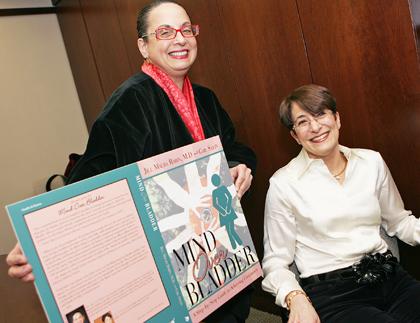By Howard Koplowitz
For those who suffer from it, incontinence is a hard condition to talk about. But a doctor at Long Island Jewish Medical Center and one of her patients have co−authored a book on the subject to help women who have been reluctant to discuss the subject.
“Incontinence really has to come out of the water closet,” said Dr. Jill Maura Rabin, head of urogynocology at LIJ and the co−author of “Mind Over Bladder: I Never Met a Bathroom I Didn’t Like.”
Rabin said one out of two women under 60 and three out of five over 60 have incontinence, but it takes seven years on average for a patient to first seek medical help because of embarrassment.
The idea for the book came about in the late 1980s, when Rabin became one of the first female members of the American Urological Gynocological Society. One of her colleagues suggested she write something for incontinent patients.
In 2000, she decided to write an accessible manual for women.
“Mind Over Bladder” includes some of the most recent therapies used to treat the condition and describes some of the advanced surgery options.
“We think it’s very comprehensive,” Rabin said of the book, which also relates some patients’ stories.
Gail Stein, a Port Washington, L.I., resident who was treated by Rabin and the other co−author of the book, said the doctor helped her condition after she was struggling with it for about 45 years.
“This is not an easy thing to talk about and [Rabin] made it like it was a cold,” said Stein, who used to live in Bayside. “I was very, very surprised that she diagnosed the problem immediately.”
After four physical therapy sessions, Stein’s condition was treated.
“I could tell I’m doing great because I don’t go to the bathroom 10 times a day,” she said. “I’m the one making my choices instead of my body choosing for me.”
A variety of factors can lead to incontinence, but Rabin said most causes are lifestyle choices.
“In many cases, it’s just a matter of what they’re doing in their daily life,” she said, such as drinking two quarts of water before going to bed.
Giving birth and menopause can also contribute to the problem because they make bladder muscles and tissue weak.
Severe psychological problems such as, senile dementia as well as medications, can also cause incontinence, Rabin said.
But she said the condition can be easily managed if a patient seeks help — either through physical therapy, medication or surgery.
“Mind Over Bladder” can be purchased at BarnesAndNoble.com or Amazon.com.
“We’ve been very happy with it so far,” Rabin said. “We think it’s going to help a lot of people.”
Reach reporter Howard Koplowitz by e−mail at hkoplowitz@timesledger.com or by phone at 718−229−0300, Ext. 173.



































